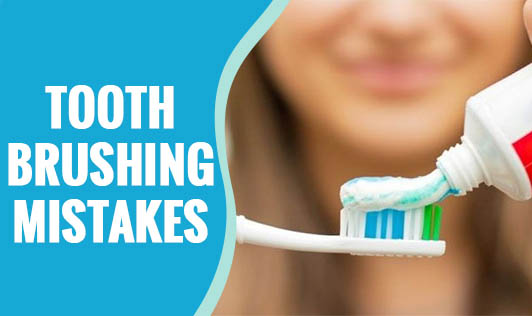Toothbrushing Mistakes
- 2 months ago
Brushing your teeth is a daily routine, but are you doing it properly? Many people think brushing regularly is enough for good oral health, but small mistakes can lead to bigger problems over time. Brushing too hard, not brushing long enough, or rinsing at the wrong time could actually harm your teeth instead of protecting them.
Do you still get bad breath, sensitive teeth, or cavities even though you brush every day? If so, your brushing routine might need a few changes. The good news is that fixing these common mistakes can make a big difference. Let’s look at the most common brushing mistakes and how to correct them for a healthier, brighter smile!
1. Using the Wrong Toothbrush
Many people pick a toothbrush based on convenience rather than effectiveness. A toothbrush with hard bristles may seem like a better option for deep cleaning, but it can damage your enamel and irritate your gums. Instead, opt for a soft-bristled toothbrush with a comfortable grip. Additionally, consider the size of the toothbrush head—if it’s too big, it may not reach all areas of your mouth, especially the back molars.
2. Brushing Too Hard
Scrubbing your teeth aggressively doesn’t make them cleaner. In fact, brushing too hard can wear down enamel and cause gum recession, leading to sensitivity and other dental issues. Use gentle, circular motions to clean effectively without causing damage. If you notice bleeding gums, it could be a sign that you’re brushing too hard or using a toothbrush with bristles that are too stiff.
3. Not Brushing for Long Enough
The suggested brushing time is two minutes, although many people do not follow it. If you rush through your brushing routine, you might miss plaque buildup in certain areas. Consider using a timer or an electric toothbrush with a built-in timer to ensure you brush for the full duration. Splitting your time evenly between different sections of your mouth can also help you clean more thoroughly.
4. Skipping the Gum Line
Most people focus only on their teeth and neglect the gum line, which is where bacteria often accumulate. Hold your toothbrush at a 45-degree angle and gently brush along the gum line to remove plaque and prevent gum disease. Neglecting this area can lead to gingivitis, the early stage of gum disease, which can progress to more serious conditions if left untreated.
5. Using an Old Toothbrush
If your toothbrush bristles are frayed or bent, it’s time to replace it. Dentists recommend changing your toothbrush every 3-4 months or sooner if the bristles are worn out. Using an old toothbrush can also lead to bacterial buildup, increasing the risk of infections and bad breath.
6. Brushing Right After Eating
Brushing immediately after eating, especially acidic foods, can erode your enamel. Acids soften the enamel, and brushing right away can cause damage. Instead, wait 30-60 minutes after eating before brushing, or rinse your mouth with water first. Drinking water or chewing sugar-free gum can help neutralize acids and freshen your mouth in the meantime.
7. Not Cleaning Your Tongue
Bacteria and food particles accumulate on your tongue, leading to bad breath and plaque buildup. Every time you brush your teeth, clean your tongue gently with your toothbrush or a tongue scraper. A coated or white-looking tongue could indicate bacterial overgrowth, which can contribute to bad breath and oral health issues.
8. Using the Wrong Toothpaste
Some toothpaste brands contain harsh abrasives that can damage enamel over time. Choose a fluoride toothpaste that strengthens enamel and helps prevent cavities. If you have sensitive teeth, look for a toothpaste formulated for sensitivity. Avoid whitening toothpaste if it causes irritation or discomfort, as some whitening agents can be harsh on your enamel.
9. Rinsing Your Mouth Immediately After Brushing
Many people rinse their mouths with water or mouthwash immediately after brushing, washing away the fluoride from the toothpaste. Instead, spit out the excess toothpaste and avoid rinsing for at least 30 minutes to allow the fluoride to work. If you use mouthwash, opt for one that contains fluoride and use it at a separate time, like after meals.
10. Not Brushing Twice a Day
Skipping brushing at night allows plaque and bacteria to accumulate overnight, increasing the risk of cavities and gum disease. Always brush twice a day—once in the morning and once before bed—for optimal oral health. If you tend to forget, setting a reminder on your phone or associating brushing with another habit, like washing your face, can help.
Conclusion
Brushing your teeth correctly is essential for maintaining good oral health. By avoiding these common mistakes and adopting proper brushing habits, you can prevent cavities, gum disease, and other dental problems. Small changes in your daily routine can make a big difference in your oral hygiene. Take the time to assess your brushing habits and improve them for a healthier smile!








